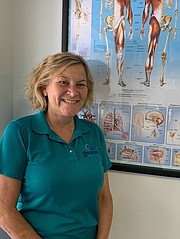By Hannah Foster-Middleton, BSc (Hons) Physiotherapy, MCSP, SRP
Remember Count Bernardino and Ronnie Butler’s cover of the song “Age ain’t nothin’ but a number”? A good thing to keep in mind and true in so many ways. What we think and how we think has a great deal to do with how our bodies react physically to life’s stresses or traumas, which includes the aging process and how we prepare to handle it.
Aging of the human body is a natural process and certain things are inevitable and happen to everyone. – things such as greying hair, diminishing hearing or eyesight, wrinkling skin. Ee are all familiar with these and accept that some or most of them will eventually come to all of us sooner or later. However, the onset of pain leading to chronic pain needn’t be one of the things we accept as a normal part of the aging process and there are measures we can take to avoid this and continue to live a healthier, more active life. The first and probably most significant thing we can do is preventive. By adopting a healthy lifestyle at an early age we are helping ourselves to stay fit or as fit as we can be whilst on this earth. In other words adopt a sensible attitude towards food, drink and fitness. People who are active early in life usually stay healthier longer. Even after a lapse of little or no exercise when we start again we will regain our fitness level faster than someone who has never exercised.
Of course it’s not always as simple as that because life is rarely simple for any of us and, healthy or otherwise, at some point we may succumb to an illness or a disease that has far reaching effects. These may include disorders such as heart disease, cancer, respiratory disease, or skeletal disorders such as osteoporosis and arthritis. These and other illnesses such as neuropathy are painful and challenging in themselves and may lead to secondary issues, such as anxiety, insomnia, depression and various cognitive symptoms. Any and all of this multitude of possible symptoms may then have a knock on effect of making us less active literally and socially. But it is not necessary to suffer and accept that this state of affairs is just a hopeless effect of the aging process. There are things we can do to improve our condition and physiotherapy can play a large part in getting us back into a better state of health and reduce our pain level.
There is no need to suffer in silence or just put up with it making ourselves miserable and frequently irritable with our loved ones. It is better if we consult a therapist sooner rather than later, meaning when we start to endure pain that doesn’t go away, we should make that call searching for a qualified physiotherapist who can offer the appropriate treatment before it gets any worse, rather than waiting until it is hardly bearable. If we wait until that point, not only have we caused ourselves unnecessary suffering but it makes the healing process so much more difficult and takes so much longer to get back to a more normal way of being. We have choices and here are other measures we can take, intellectually and emotionally. We can seek out information on chronic pain management, thus reducing our fear. We can make sure we try to control negativity, remembering that our thoughts have an impact on our physical bodies. We can try relaxation techniques such as yoga or meditation and with our physiotherapist’s guidance we can do appropriate exercises, follow a healthy diet and a sleep regime. Good sleep goes a long way to help the healing process and making our everyday living more comfortable, so that potentially we can sing along and agree that “age ain’t nothin’ but a number.”
• For questions and comments, call Hannah Foster-Middleton at 356 4806, e-mail
genesisphysiotherapy@gmail.com, or visit
www.physiotherapybahamas.com.





Comments
Use the comment form below to begin a discussion about this content.
Sign in to comment
Or login with:
OpenID